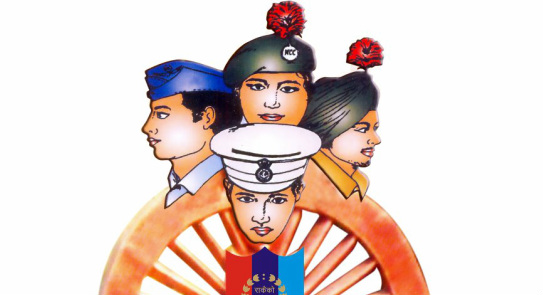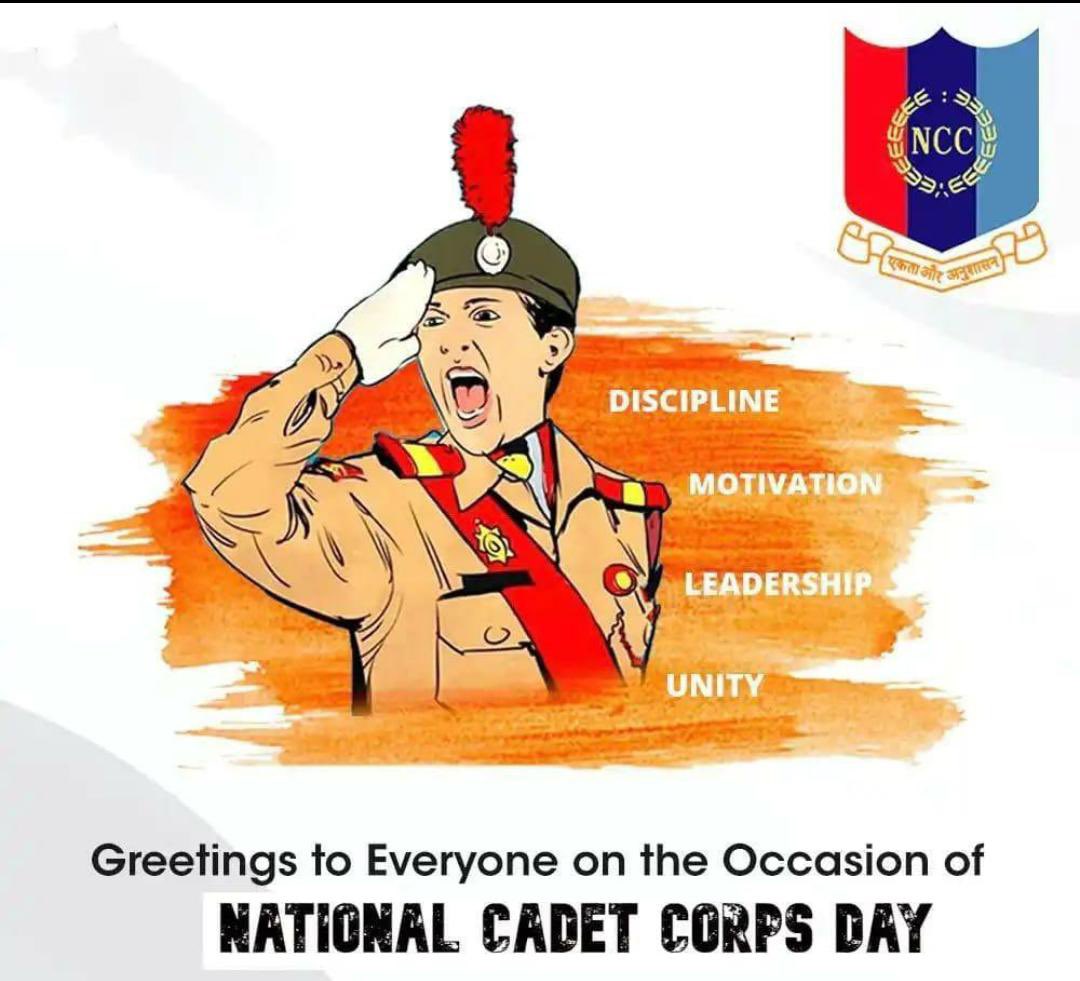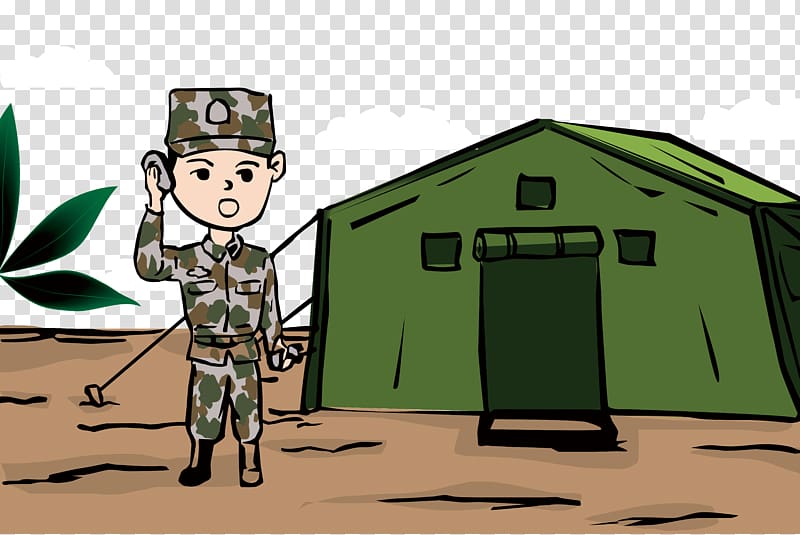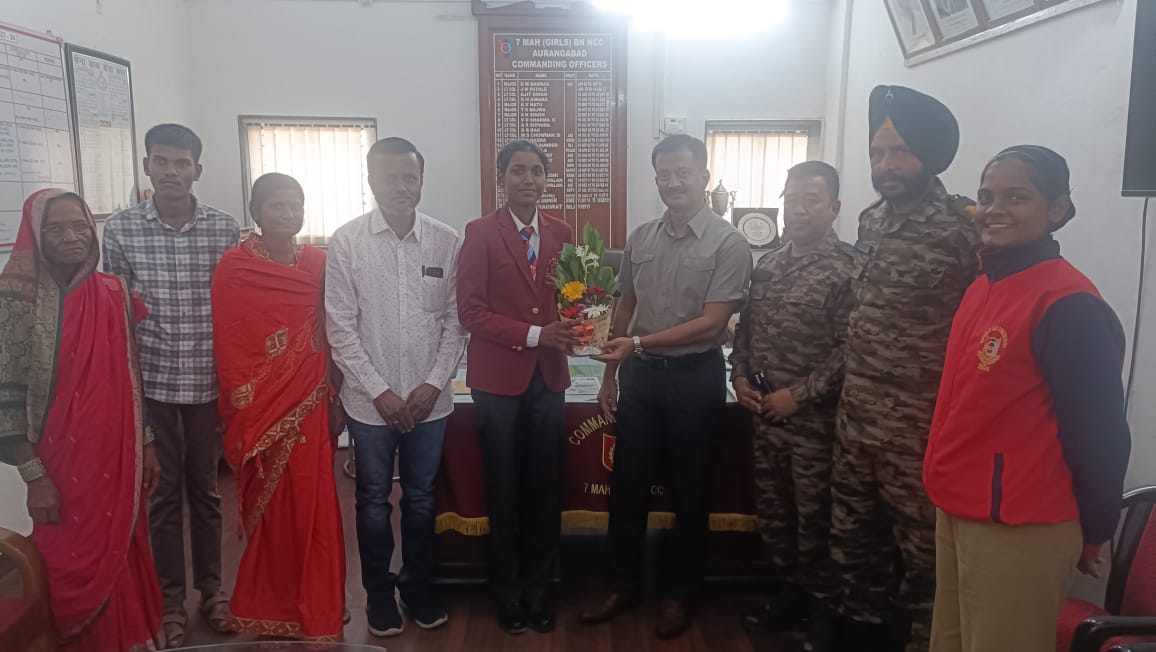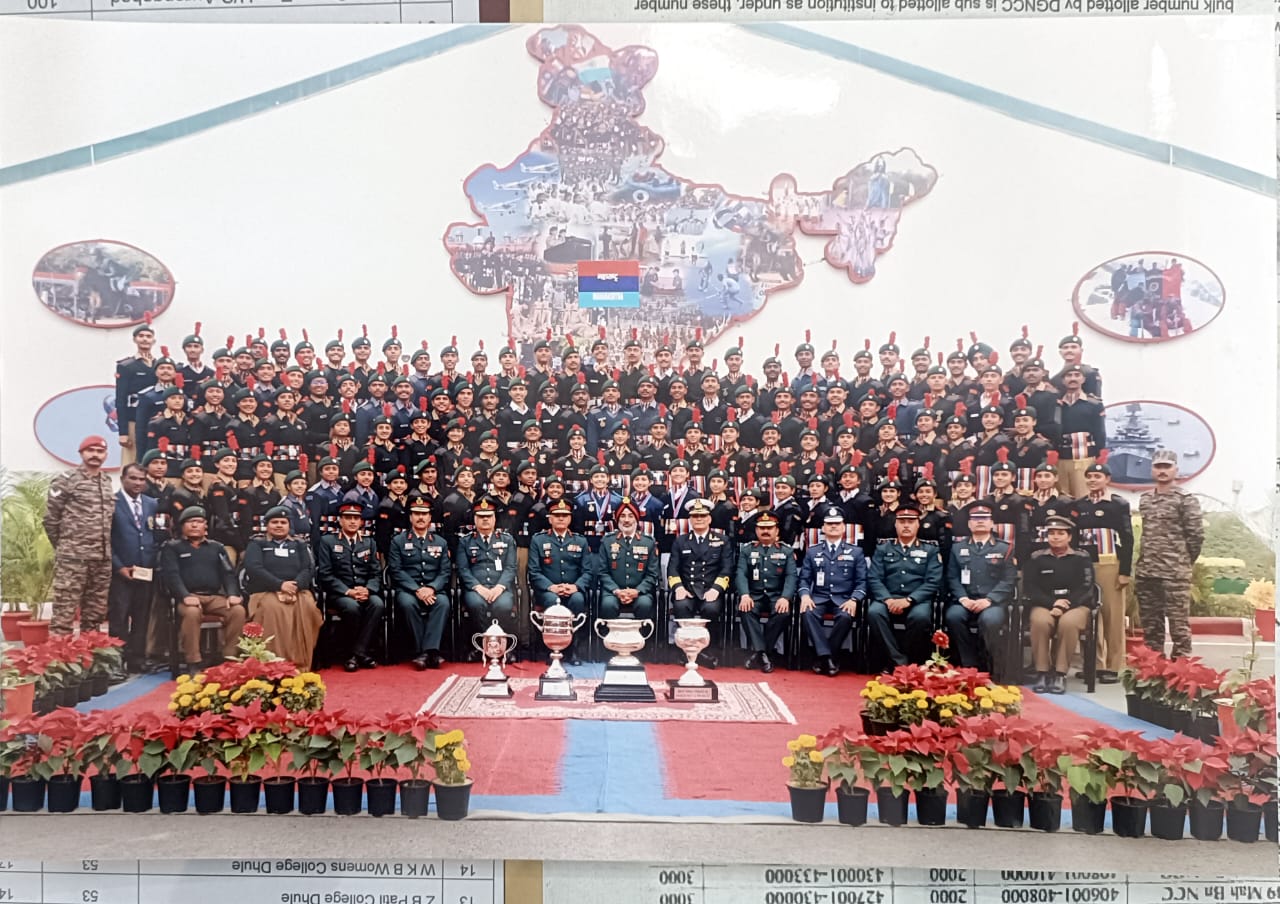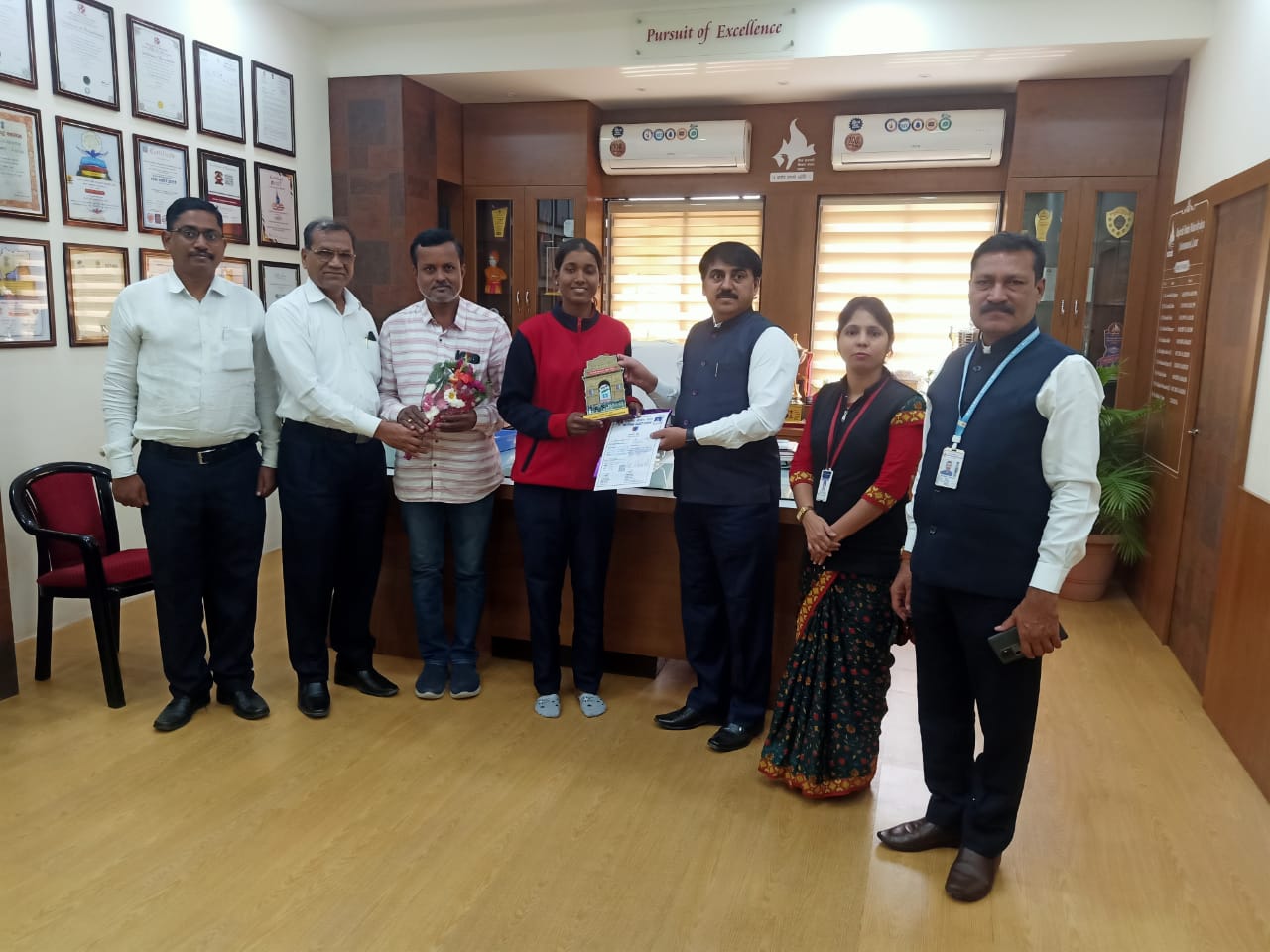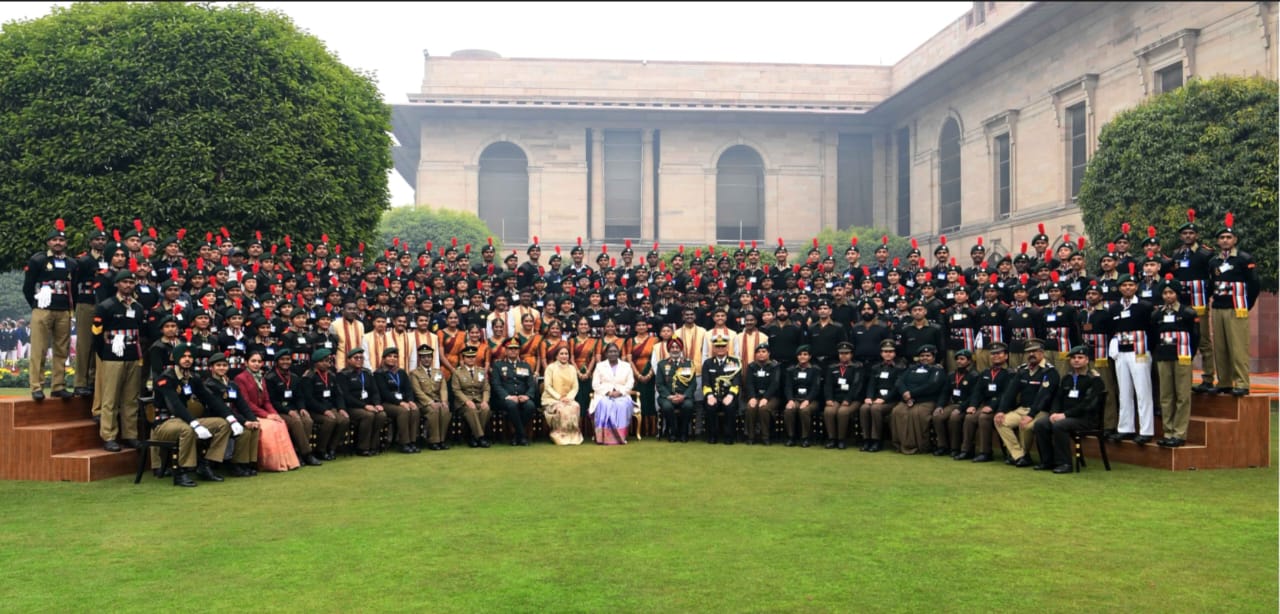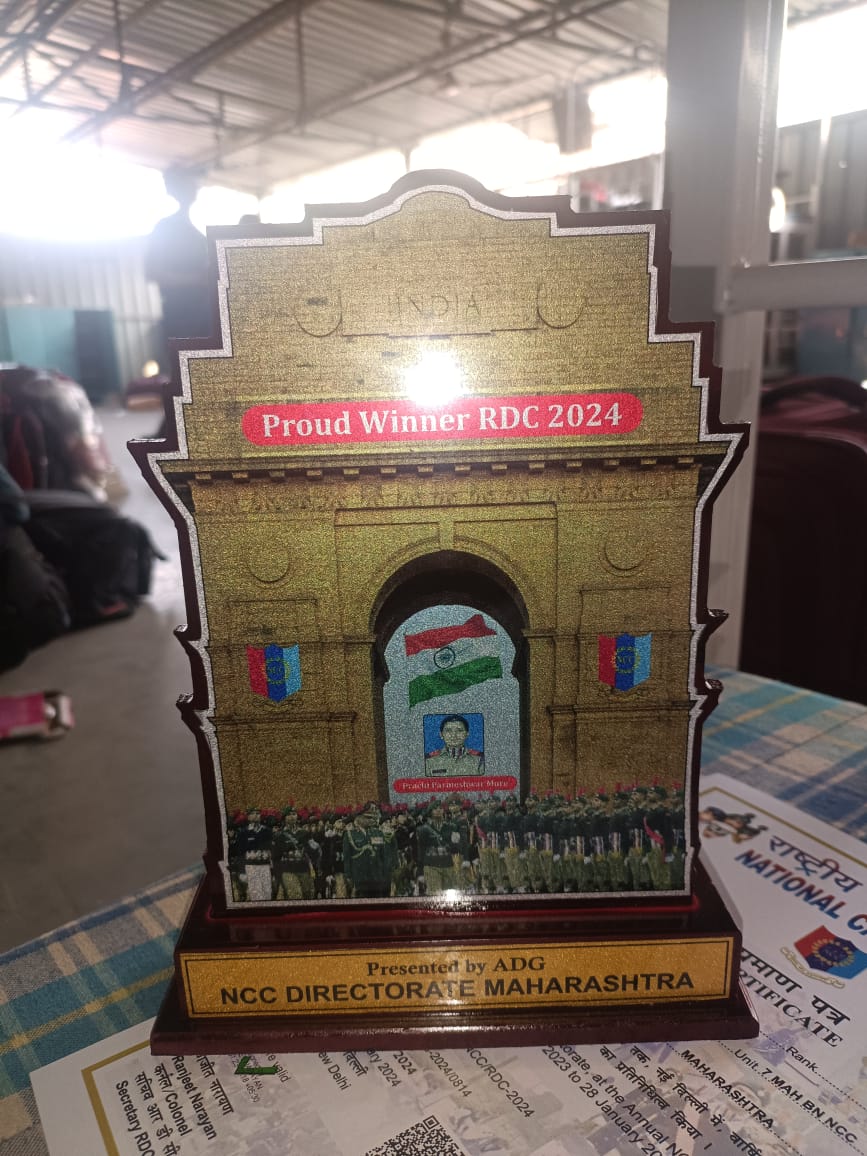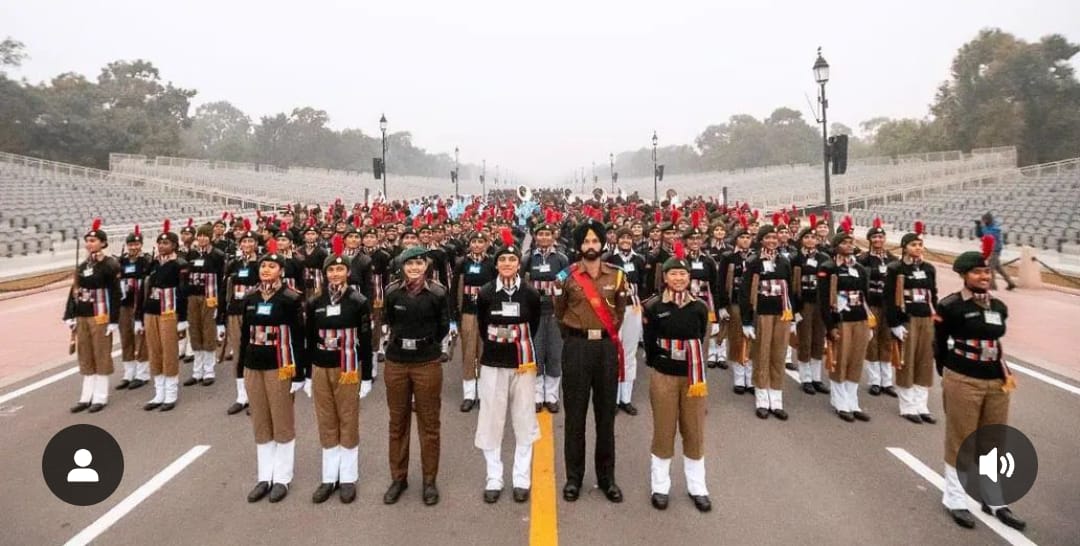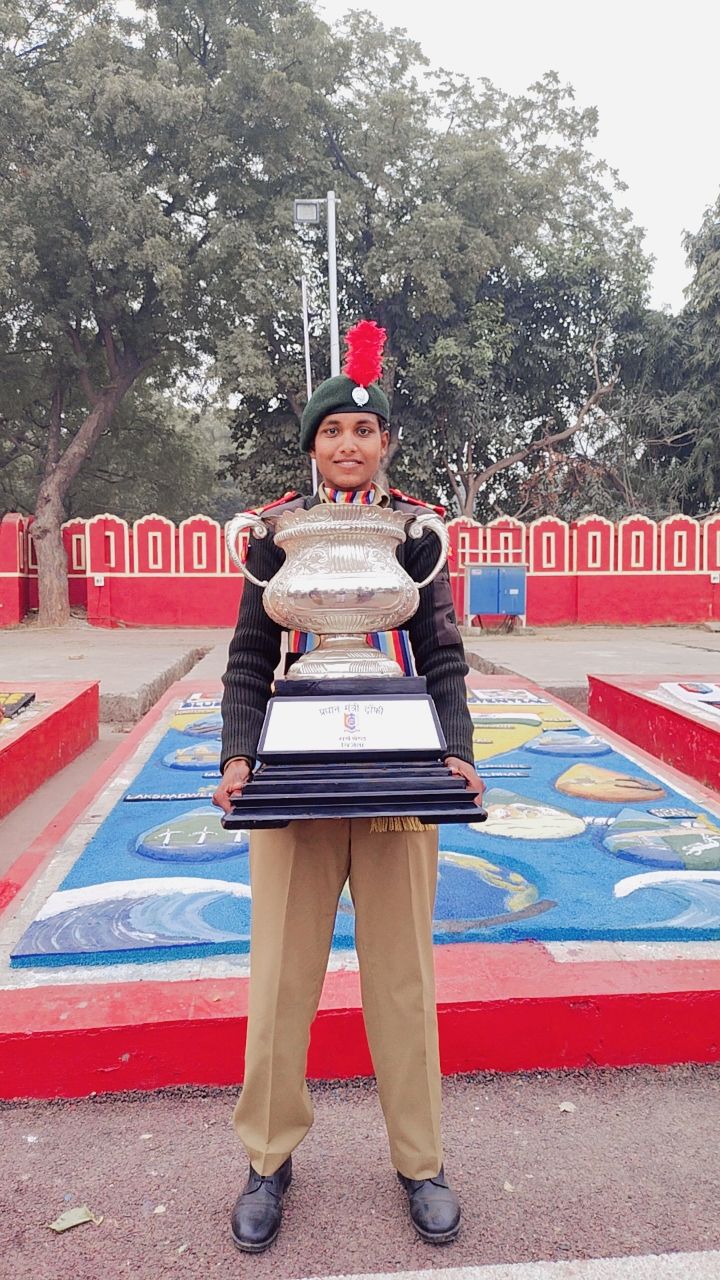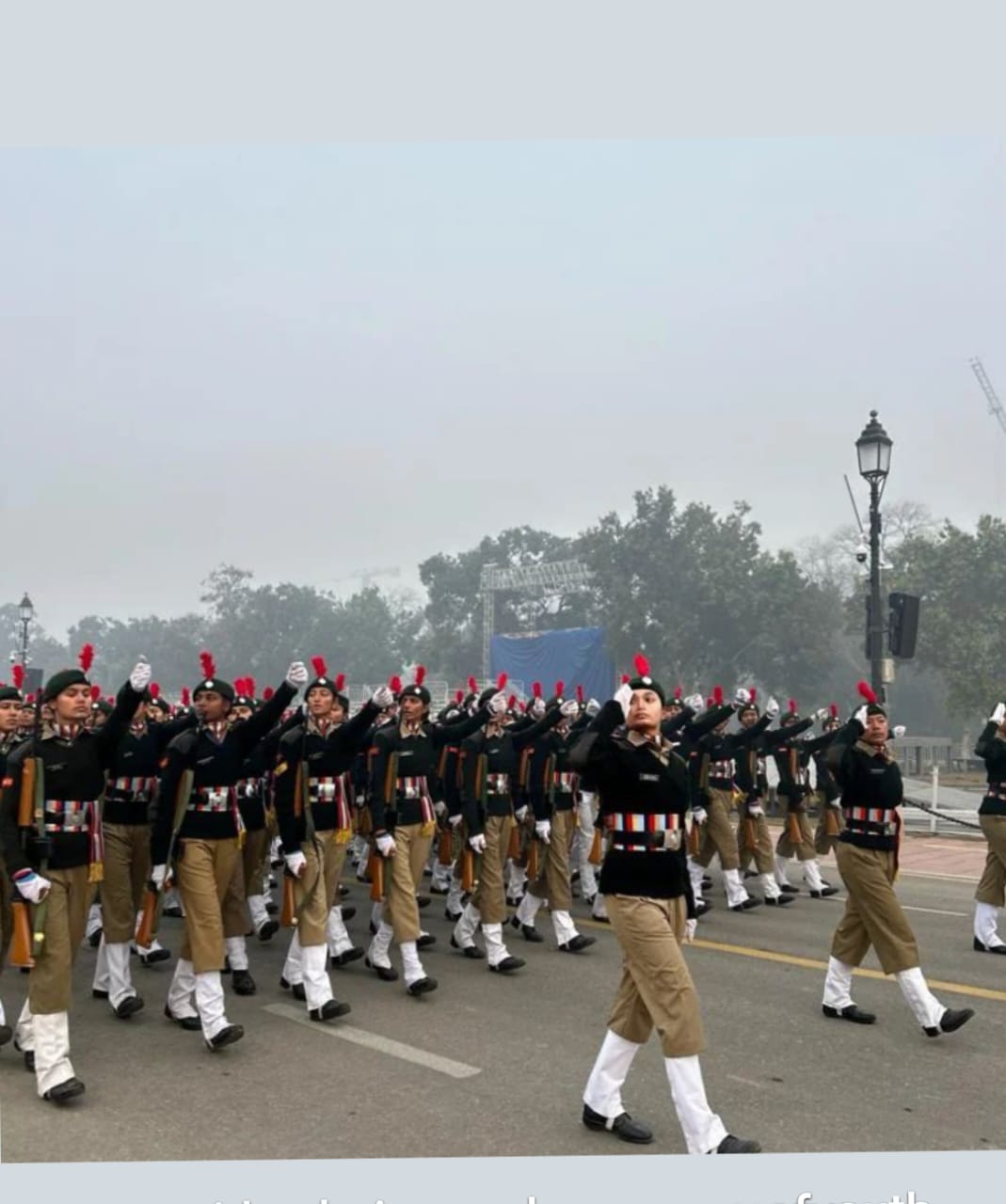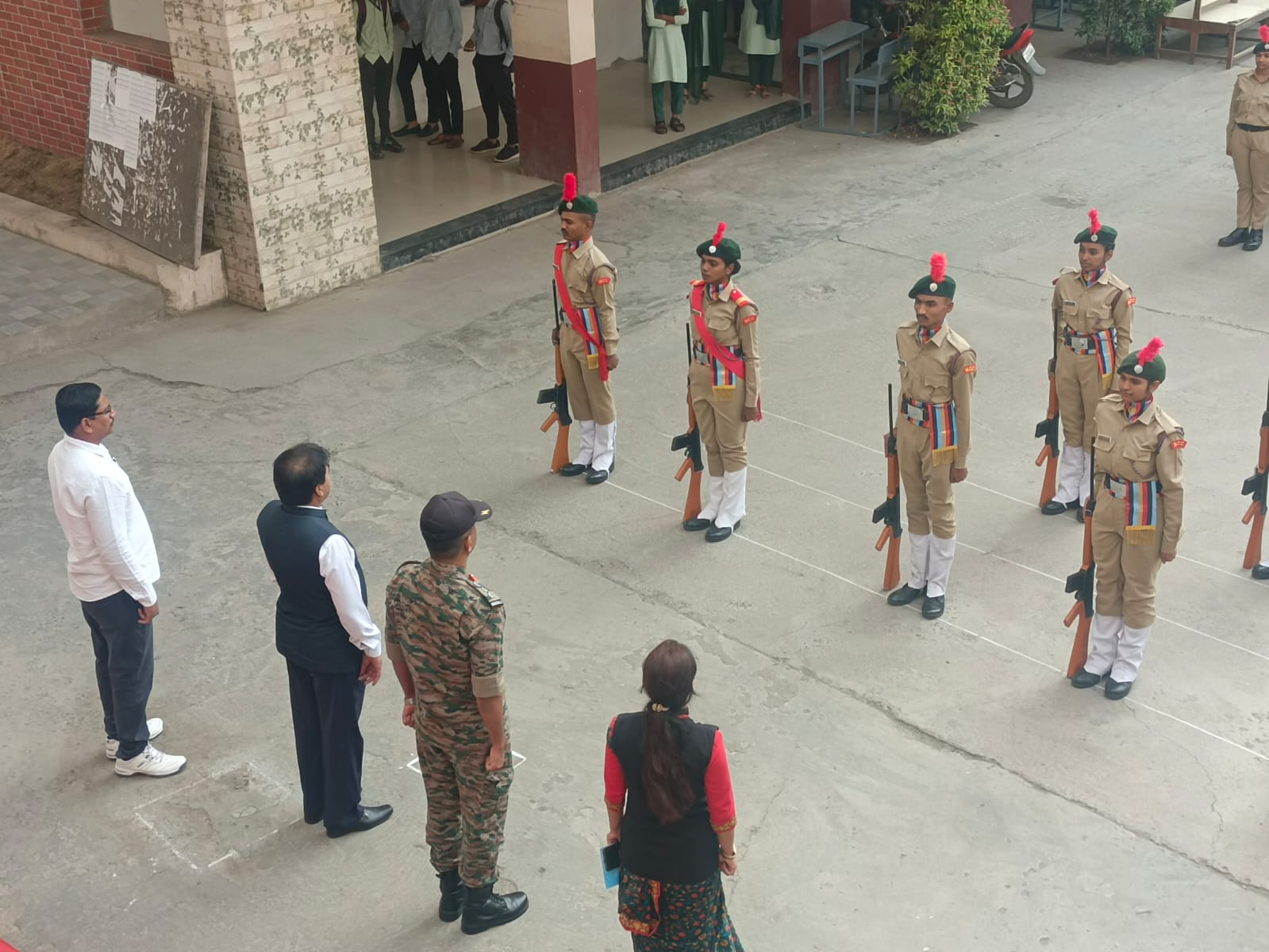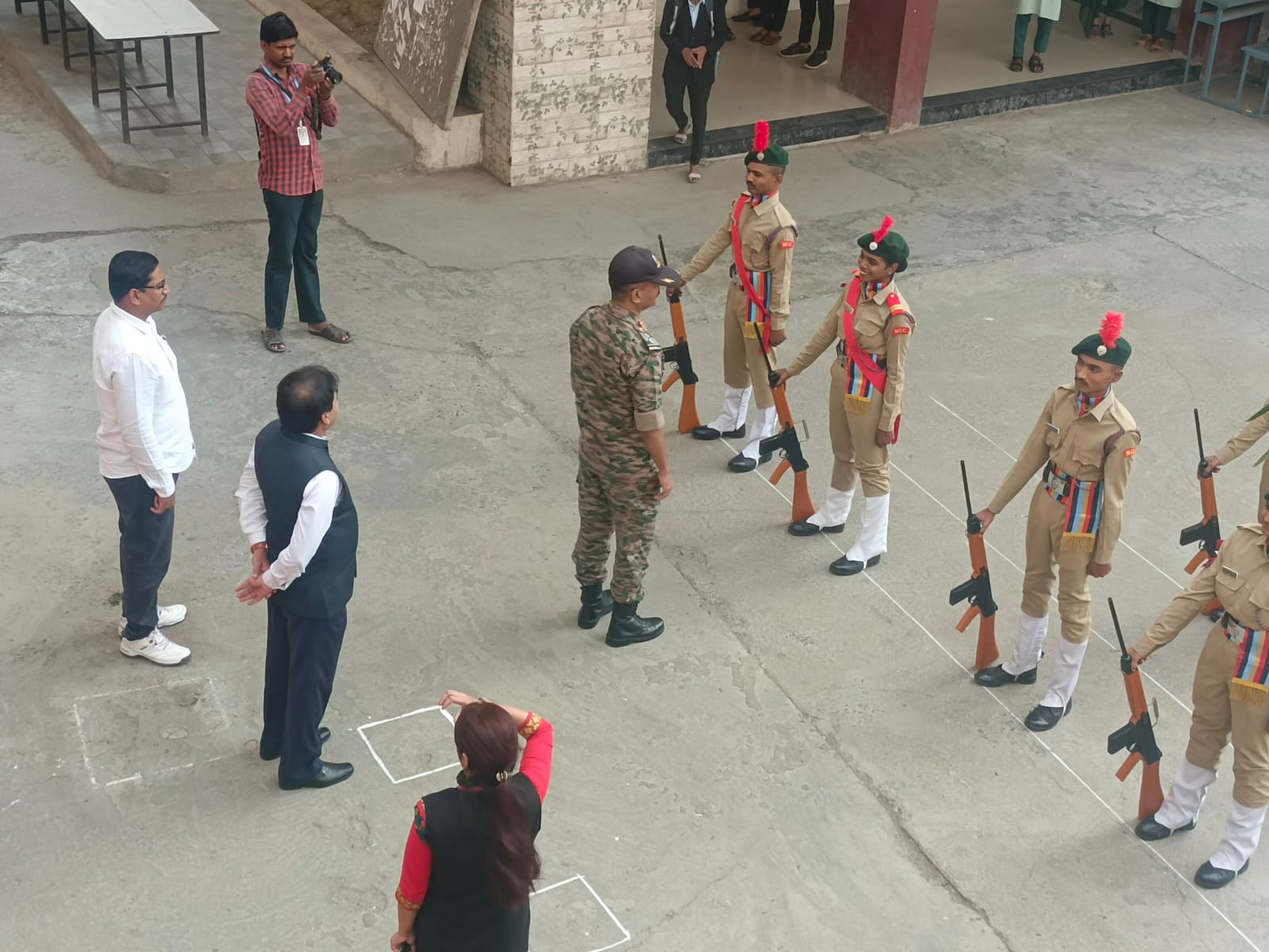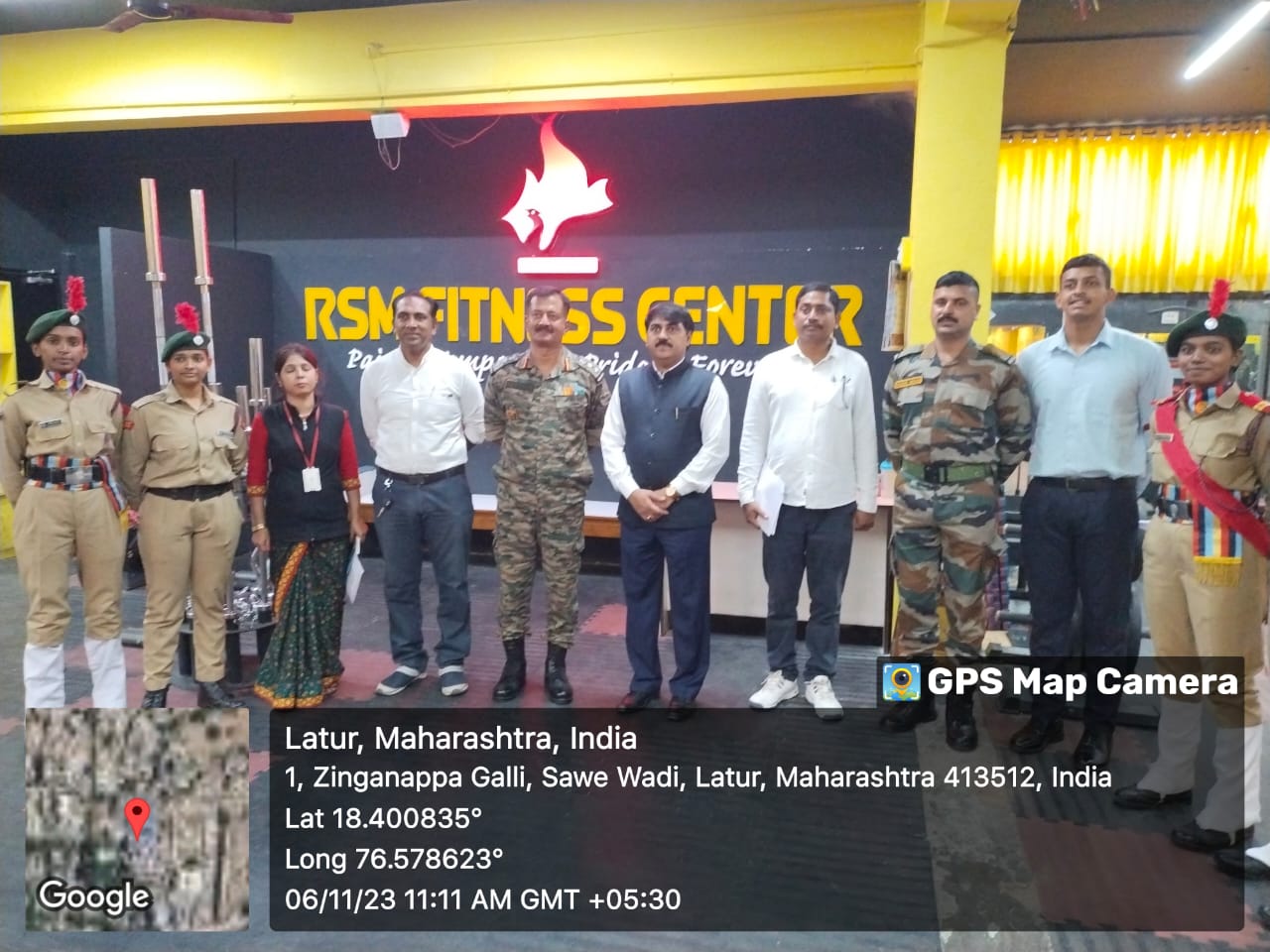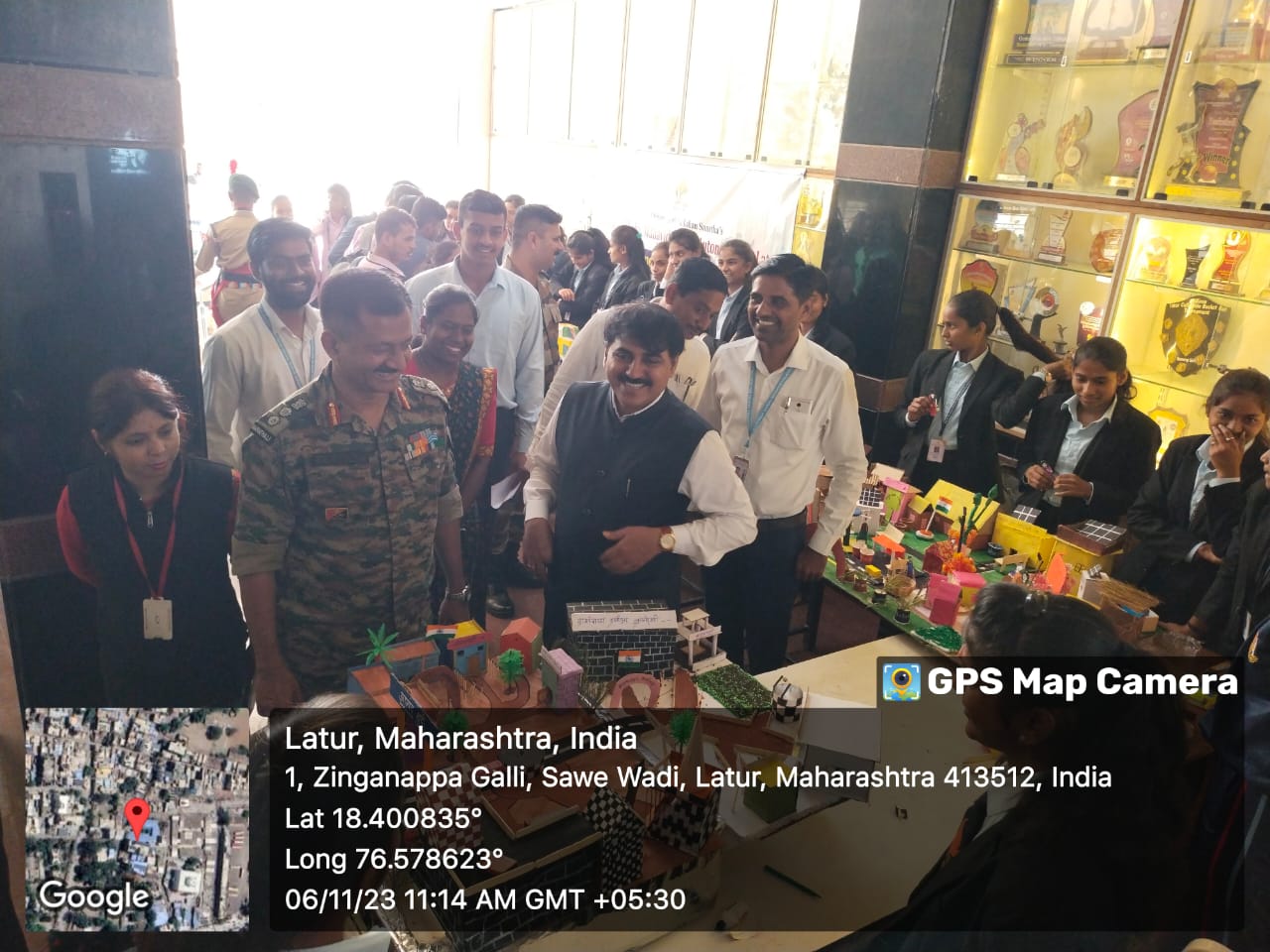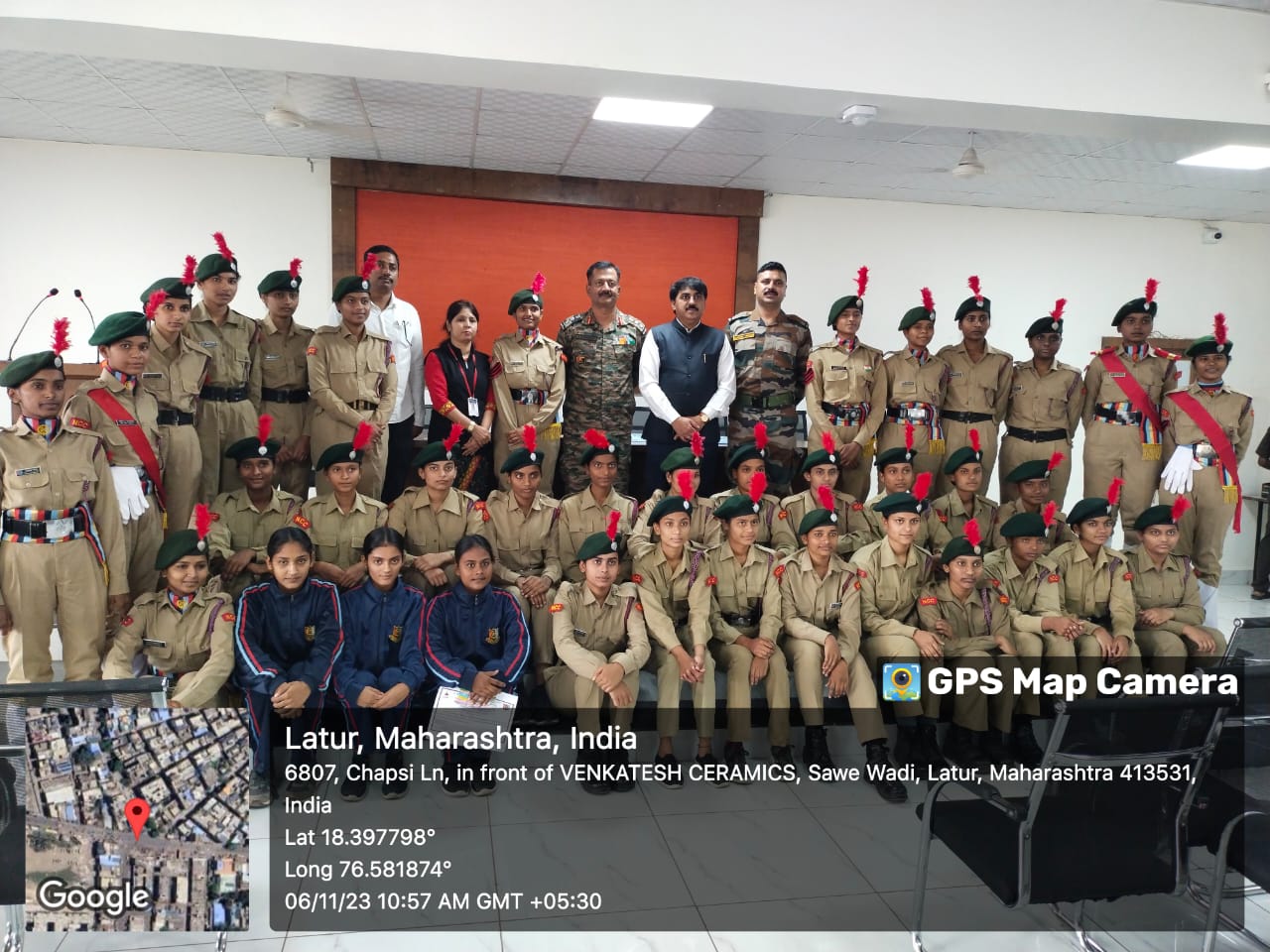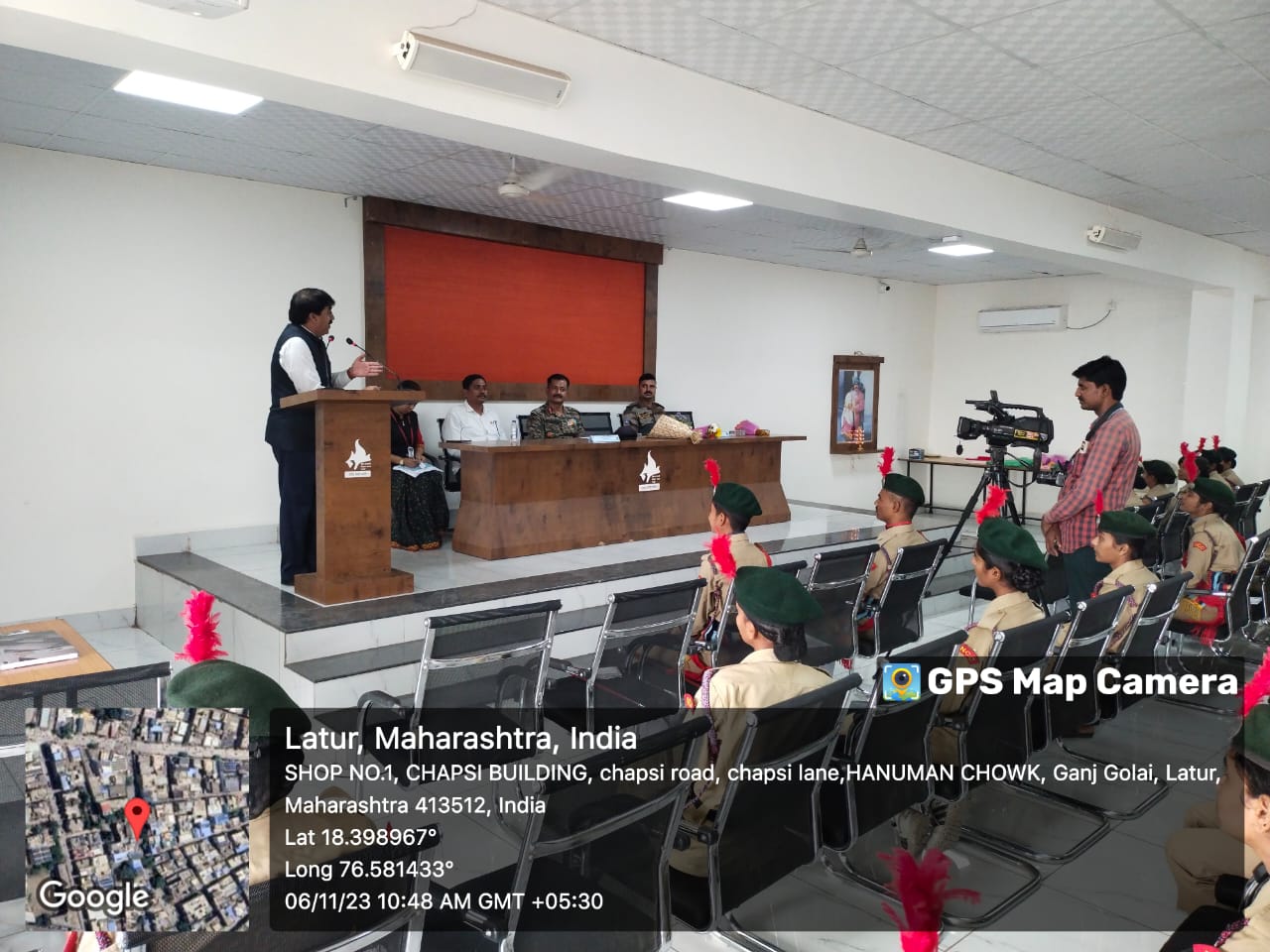
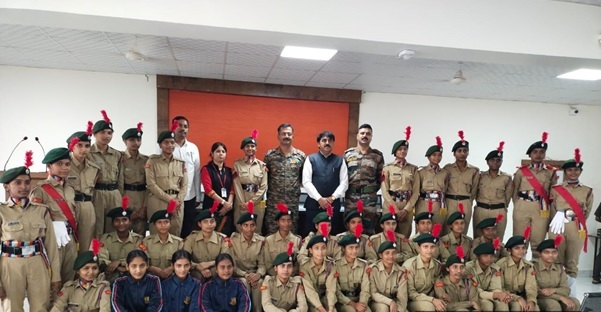
NCC Girls Unit
Affiliated to 7 Maharashtra Girls BN NCC, Aurangabad
1. Establishment Year : 1972-73
2. Aims of NCC : The ‘Aims’ of the NCC laid out in 1988 have stood the test of time and continue to meet the requirements expected of it in the current socio–economic scenario of the country. The NCC aims at developing character, comradeship, discipline, a secular outlook, the spirit of adventure and ideals of selfless service amongst young citizens. Further, it aims at creating a pool of organized, trained and motivated youth with leadership qualities in all walks of life, who will serve the Nation regardless of which career they choose. Needless to say, the NCC also provides an environment conducive to motivating young Indians to join the armed forces.
3. Enrolment: Enrolment of cadets is as per the directives at Head quarter Aurangabad Group working under Maharashtra Directorate of NCC organization.
4. Training: Training Period : 03 Years
Parade days of timing : 02 days in week (Total 120 days)
Friday : 04.00 pm to 06.00 pm
Saturday: 04.00 pm to 06.00 pm
5. Training staff :
Associate NCC Officer - Lt. Dr. ArchanaTak
Visiting PI Staff - JCO and NCO from 7 Maharashtra Girls BN NCC,
Aurangabad.
6. Training Syllabus : Training Programme and syllabi is framed by NCC organization at national level. NCC Syllabus covers entire aspects to achieve aims of NCC.
It. includes:
Drill, Map Reading, Field Engineering, Obstacle; Weapon Training First and Health & Hygiene, Military Organization, National Integration Self Defense, Posture Training and Yoga, Disaster management etc.
(B) Nature of training :
1. On parade ground
2. In the class room
3. During various camps
(ATC/ALC/BLC/NIC/Pre. RD / RD Group Selection/TSC/Trekking /
Parasailing/ Scuba diving.)
4. Guest lectures
5. Firing Training in Training Camp
8. Participation in social services :
Our NCC cadets participate in social services like Tree Plantation, Blood Donation, Pulse Polio Drive, Anti-AIDS Rally and Disaster Management, Fit India Freedom Run, etc.
9. Incentives :
1. NCC organization motivates cadets, by offering scholarships and giving them washing and refreshment allowance as per NCC rules of DG NCC to the eligible cadets.
2. SRTM, University, Nanded gives benefit of additional five marks at final year degree examination of under graduate level eligible NCC Cadet every year.
3. In Annual Gathering Programme, our college offers prizes to cadets for their special achievement during various camp activities.
NCC Organization:
The NCC is headed by the Director General (DG), an officer of three-star rank. The DG is assisted by two Additional Director Generals (A and B) of two-star rank (major-general, rear-admiral or air vice-marshal). Five Brigadier level officers and other civil officials also assist him.
The Headquarters is located in Delhi. The organisational structure continues as follows:
• Directorate – There are 17 Directorates [6] located in the state capitals headed by an officer of the rank of a Maj Gen from the three Services.
• Division / Regimental Corps – There are 3 such Specialised Corps located in Mumbai, Delhi and Bangalore respectively. They are independent of the state directorate and report to the HQ. These divisions form the support function of the regular NCC. Each is headed by a Senior Officer- an equivalent rank of (Lt.) General.
• Group – Depending upon the size of the state and growth of NCC in the states, Directorates have up to 14 Group Headquarters under them through which they exercise their command and control of the organisation in the state. Each group is headed by an officer of the rank of Brigadier or equivalent known as Group Commander.
• Battalion- Each NCC Group Headquarters control 5–7 units (Bns) commanded by Colonel/Lt.Col or equivalent.
• Company – Each Battalion consists of companies which are commanded by the Associate NCC Officer (ANO) of the rank of lieutenant to major.
In all there are 96 Group Headquarters in the country who exercise control over a network of 700 Army wing units (including technical and girls unit), 73 Naval wing units and 64 Air Squadrons. There are two training establishments namely Officers Training School, Kamptee (Nagpur, Maharashtra) and Women Officers Training School, Gwalior. Besides this Vice Chancellors of various universities across India are conferred with honorary rank of commandant in NCC, to promote and support NCC in their respective University.
Outcomes
The NCC is a responsive, learning, and continuously evolving organization. Its activity is guided by certain Core Values that we endeavour to in still among all ranks of the NCC. These include the following:
1. A sense of patriotic commitment to encourage cadets to contribute to national development.
2. Respect for diversities in religion, language, culture, ethnicity, lifestyle, and habitat to in still a sense of National unity and social cohesion.
3. Abiding commitment to learn and adhere to the norms and values enshrined in the Indian Constitution.
4. Understanding the value of a just and impartial exercise of authority.
5. Ability to participate in community development and other social programs.
6. A healthy lifestyle is free of substance abuse and other unhealthy practices.
7. Sensitivity to the needs of poor and socially disadvantaged fellow citizens.
8. Inculcating habits of restraint and self-awareness.
9. Understanding the values of honesty, truthfulness, self-sacrifice, perseverance, and hard work.
10. Respect for knowledge, wisdom, and the power of ideas.
Song
1. The desirability of composing a NCC song was considered in January 1956. The official song of the NCC – ‘Kadam Mila KeChal’- was adopted in 1963 and registered in 1969 with the approval of the Ministry of Defence. In 1974, it was felt that the NCC song has failed to catch the imagination of the youth and there was a need for a change.
2. Director of documentary film on NCC , ‘A Cadet’s Diary’, happened to hear the song- ‘Ham Sab Hindi Hain’- which appears to have been first sung at a Youth Festival at Chandigarh, sometime during 1968-69 and he introduced it in the documentary film. The song was a hit and played repeatedly in Republic Day Camps. In 1980, the word ‘Hindi’ was substituted with ‘Bhartiya’.
NCC Song
Hum Sab Bhartiya Hain, Hum Sab Bhartiya Hain.
Apni Manzil Ek Hai, Ha, Ha, Ha, EkHai, Ho, Ho, Ho, Ek Hai
Hum Sab Bhartiya Hain
Kashmir Ki Dharti Rani Hai,
Sartaj Himalaya Hai,
Sadiyon Se Hamne Isko Apne Khoon Se Pala Hai
Desh Ki Raksha Ki Khatir, Hum Shamshir UthaLenge,
Hum Shamshir UthaLenga.
Bikhere-Bikhere Tarey Hain Hum Lekin Jhilmil Ek Hai
Ha, Ha, Ha, Ek Hain
Hum Sab Bhartiya Hain,
Mandir Gurdware Bhi Hain Yahan
Aur Masjid Bhi Hai Yahan,
Girja Ka Hai Ghadiyal Kahin
Mullah Ki Kahin Hai A jaan.
Ek Hi Apna Ram Hai, Ek Hi Allah Taala Hai,
Ek Hi Allah Taala Hai, Rang Birange Deepak Hai Hum,
Lekin Jagmag EkHai Ha, Ha, EkHai, HoHo, Ho, EkHai.
Hum Sab BhartiyaHain, Hum Sab BhartiyaHain.
Certificate Examination
1. Certificate – B:
It can be taken by SD/SW cadets of the NCC, after class year 10 and
those studying for a degree. The candidate must have attended a minimum 75% of total
training periods laid down in the syllabus for the first and second years of SD/SW NCC
(All Wings). The cadet must have attended one Annual Training Camp/NIC. Cadets who
possess Certificate - A will be awarded 10 bonus marks. An air wing cadet must do a
minimum 10 Glider launches.
2. Certificate – C:
Is the highest level certificate for NCC cadets. It can be taken in the
third year of training, in the third year of degree course. Those who possess a Certificate -
B can take it in the first year after their +2, and in the first year of their degree. The cadet
must have attended two Annual Training Camps or one Annual Training Camp and one
of the following: RD Camp Delhi, Centrally Organised Camp, Para Training Camp and
Attachment Training with service units, National Integration Camp, Youth Exchange
Programme, or Foreign Cruise (Navy Wing only).
3. Grading in Certificate
Three certificates are awarded: 'A' grade, 'B' grade, 'C' grade.
The best grade is A, which has the highest value. A cadet has to obtain 45% marks in each
paper & 50% marks in the aggregate to pass the examination. Grading is based on total marks
obtain will be awarded as follows. Grading 'A' – Cadets obtaining 80% marks and above,
Grading 'B' – Cadets obtaining 65% marks and above but below 80%,
Grading 'C' – Cadets obtaining 50% marks and above but below 65%, Fail – Cadets
obtaining less than 45% in any paper or less than 50% in aggregate.
Pre TSC/TSC/Pre RDC/RDC tsc
| Sr. No. | Training Year | Name of the Cadet | Event | Pre TSC/TSC/Pre RDC/RDC | Held at |
| 1 | 2023-24 | LCPL Prachi Parmeshwar More | Drill | Unit level Selection Camp | Pravaranagar |
| Pre RDC-I | Rahuri | ||||
| Pre RDC- II | Ahmednagar | ||||
| Pre RDC-III | Ahmednagar | ||||
| RDC IGC | Pune | ||||
| CAT-I | Pune | ||||
| CAT-II | Pune | ||||
| CAT-III | Pune | ||||
| CAT-IV | Pune | ||||
| CAT-V | Pune | ||||
| Republic Day Camp | New Delhi | ||||
| 2 | 2023-24 | SUO Kalyani Shashikant Sakhare | Cultural | Unit level Selection Camp | Pravaranagar |
| Pre RDC-I | Rahuri | ||||
| Pre RDC- II | Ahmednagar | ||||
| Pre RDC-III | Ahmednagar | ||||
| RDC IGC | Pune | ||||
| 3 | 2023-24 | JUO Sanjana Sukhadev Davkare | Firing | Unit level Selection Camp | Pravaranagar |
| Pre TSC-I | Pravaranagar | ||||
| Pre TSC-II | Pravaranagar | ||||
| Pre TSC-III | Pravaranagar | ||||
| 4 | 2023-24 | CQMS Mahek Gaffarmiya Ansari | Cultural | Unit level Selection Camp | Pravaranagar |
| Pre RDC-I | Rahuri | ||||
| Pre RDC- II | Ahmednagar | ||||
| Pre RDC-III | Ahmednagar | ||||
| RDC IGC | Pune | ||||
| 5 | 2022-23 | CDT Sanjana Sukhadev Davkare | Firing | Unit level Selection Camp | Pravaranagar |
| Pre TSC-I | Aurangabad | ||||
| Pre TSC-II | Aurangabad | ||||
| Pre TSC-III | Aurangabad | ||||
| TSC IGC | Pune | ||||
| 6 | 2022-23 | CDT Pranjal Mugale | JDFS | Unit level Selection Camp | Pravaranagar |
| Pre TSC-I | Aurangabad | ||||
| Pre TSC-II | Aurangabad | ||||
| Pre TSC-III | Aurangabad | ||||
| TSC IGC | Pune | ||||
| 7 | 2022-23 | JUO Sangita Kshirsagar | Drill | Unit level Selection Camp | Pravaranagar |
| Pre TSC-I | Aurangabad | ||||
| 8 | 2022-23 | CDT Sadhana Ban | JDFS | Unit level Selection Camp | Pravaranagar |
| Pre TSC-I | Aurangabad | ||||
| 9 | 2019-20 | SUO Sneha Ramesh Tarkase | Drill | Unit level Selection Camp | Aurangabad |
| Pre TSC-I | Aurangabad | ||||
| Pre TSC- II | Aurangabad | ||||
| Pre TSC-III | Aurangabad | ||||
| RDC IGC | Pune | ||||
| 10 | 2019-20 | JUO Ankita Ashok Holikar | Drill | Unit level Selection Camp | Aurangabad |
| Pre RDC-I | Aurangabad | ||||
| Pre RDC-II | Aurangabad | ||||
| Pre RDC-III | Aurangabad |
Associate NCC Officer
| Sr.No. | Name of the ANO | Period | Photo |
|---|---|---|---|
| 1 | Lt. Dr. Archana Dhanraj Tak | 2018 to till date |  |
Camps Attended:
| Sr.No | Details |
|---|---|
| 1 | Worked as Care Taker Officer of NCC CATC Camp held at Ahmednagar organized by 17 Maharashtra BN NCC, Ahmednagar from 17th to 27th July 2018. |
| 2 | Worked as Care Taker Officer of NCC CATC Camp held at Aurangabad organized by 7 Maharashtra Girls BN NCC, Aurangabad from 15th to 24th November 2018. |
| 3 | Worked as Care Taker Officer of NCC CATC Camp held at Pune organized by 51 Maharashtra BN NCC, Aurangabad from 01st to 05th November 2019. |
| 4 | Worked as Caretaker Program Officer of NSS Residential Camp, Rajarshi Shahu Mahavidyalaya (Autonomous), Latur 18th to 24th February 2020. |
| 5 | Worked as Associate NCC Officer of NCC CATC Camp held at Mahatma Basaweshwar College, Latur by 53 Maharashtra BN NCC, Latur from 08th to 12th February 2021. |
| 6 | Worked as Associate NCC Officer of NCC ATC Camp held at Rajarshi Shahu Mahavidyalaya (Autonomous), Latur by 7 Maharashtra Girls BN NCC, Aurangabad from 20th to 26th September 2021. |
| 7 | Worked as Associate NCC Officer of NCC CATC Camp held at Jawahar Navoday Vidyalaya, Latur by 53 Maharashtra BN NCC, Latur from 28th June 2022 to 07th July 2022. |
| 8 | Worked as Associate NCC Officer of NCC ATC Camp held at PVP College, Pravaranagar by 7 Maharashtra Girls BN NCC, Aurangabad from 28th May to 06th June 2023 |
| 9 | Worked as Associate NCC Officer of NCC Pre RDC-I Camp held at Mahatma Phule Krushi Vidyapeeth, Rahuri by 57 Maharashtra BN NCC, Ahmednagar from 13th to 22nd September 2023. |
| 10 | Worked as Associate NCC Officer of NCC Pre RDC-II Camp held at MICR, at Ahmednagar by 17 Maharashtra BN NCC, Ahmednagar from 23rd September to 02nd October 2023. |
Seminars/Workshops/Guest Lectures/ Conferences/Webinars Organized:-
| Sr. No. | Details |
| 1 | Worked as Convener Rajarshi Shahu Mahavidyalaya (Autonomous), Latur sponsored Five day College level Workshop on ‘Modi Script Primary Training’, 26th to 30th July 2016. |
| 2 | Worked as Convener of Rajarshi Shahu Mahavidyalaya (Autonomous), Latur sponsored Two Day National level Seminar on ‘Changing Trends in Indian History’, 10th & 11th April 2017. |
| 3 | Worked as Convener Rajarshi Shahu Mahavidyalaya (Autonomous), Latur sponsored Four Day College level Workshop on ‘Modi Script Primary Training’, 11th to 14th July 2019. |
| 4 | Worked as Co-Organizer Rajarshi Shahu Mahavidyalaya (Autonomous), Latur sponsored One Day Heritage Walk for ‘Preservation of Historical and Cultural Heritage : Kharosa Caves’ 19th January 2020. |
| 5 | Worked as Convener Rajarshi Shahu Mahavidyalaya (Autonomous), Latur sponsored Workshop on “Career Opportunities in History”, 02nd January 2021. |
| 6 | Worked as Convener Rajarshi Shahu Mahavidyalaya (Autonomous), Latur sponsored Workshop on “Incentives for NCC Cadets”, 06th January 2021. |
| 7 | Worked as Convener Rajarshi Shahu Mahavidyalaya (Autonomous), Latur sponsored Workshop on “Leadership Management”, 25th January 2021. |
| 8 | Worked as Convener Rajarshi Shahu Mahavidyalaya (Autonomous), Latur sponsored Workshop on “CPR”, 01st February 2021. |
| 9 | Worked as Convener Rajarshi Shahu Mahavidyalaya (Autonomous), Latur sponsored Workshop on “Importance of Geography in Study of History”, 23rd March 2021. |
| 10 | Worked as Convener Rajarshi Shahu Mahavidyalaya (Autonomous), Latur sponsored Guest Lecture on “The Contribution of Jainism and Buddhism in Indian Culture”, 14th July 2022. |
| 11 | Worked as Convener Rajarshi Shahu Mahavidyalaya (Autonomous), Latur sponsored One Day Educational Study Tour at Ter and Yedshi, 07th August 2022. |
| 12 | Worked as Convener Rajarshi Shahu Mahavidyalaya (Autonomous), Latur sponsored State Level Online Webinar on Freedom Struggle Movement and 75 Years of Independence of India, 20th August 2022. |
| 13 | Worked as Convener Rajarshi Shahu Mahavidyalaya (Autonomous), Latur sponsored Motivational Speech on “Contribution on Maharashtra in Indian Freedom Movement”, 29th August 2022. |
| 14 | Worked as Convener Rajarshi Shahu Mahavidyalaya (Autonomous), Latur sponsored History Association Inauguration, 25th August 2022. |
| 15 | Worked as Convener Rajarshi Shahu Mahavidyalaya (Autonomous), Latur sponsored Food Festival: Food Culture in India, 25th August 2022. |
| 16 | Worked as Convener Rajarshi Shahu Mahavidyalaya (Autonomous), Latur sponsored “135th Birth Anniversary of Padambhushan Karmveer Bhaurao Patil”, 22nd September 2022. |
| 17 | Worked as Convener Rajarshi Shahu Mahavidyalaya (Autonomous), Latur sponsored “134th Birth Anniversary of Bharatratna Dr. Sarvepalli Radhakrishnan”, 05th September 2022. |
| 18 | Worked as Convener Rajarshi Shahu Mahavidyalaya (Autonomous), Latur sponsored “Hyderabad Freedom Struggle Movement: Books and Rare Newspaper Exhibition”, 12th October 2022. |
| 19 | Worked as Convener Rajarshi Shahu Mahavidyalaya (Autonomous), Latur sponsored The 105th Birth Anniversary of Indira Gandhi, 19th November 2022. |
| 20 | Worked as Convener Rajarshi Shahu Mahavidyalaya (Autonomous), Latur sponsored The 133rd Birth Anniversary of Pandit Jawaharlal Nehru, 14th November 2022. |
| 21 | Worked as Local Secretary Rajarshi Shahu Mahavidyalaya (Autonomous), Latur sponsored “30th Session of Akhil Maharashtra Itihas Parishad”, 09th & 10th December 2022. |
| 22 | Worked as Convener Rajarshi Shahu Mahavidyalaya (Autonomous), Latur sponsored Exhibition of Historical Coins, Weapons and Postage Stamps, 09th December 2022. |
| 23 | Worked as Convener Rajarshi Shahu Mahavidyalaya (Autonomous), Latur sponsored 192nd Birth Anniversary of Savitribai Phule, 03rd January 2023. |
| 24 | Worked as Convener Indian Council of Social Science Research, New Delhi sponsored Two Day National Seminar on The Contribution of Marathwada in Hyderabad Freedom Struggle Movement, 06th & 07th January 2023. |
| 25 | Worked as Convener Rajarshi Shahu Mahavidyalaya (Autonomous), Latur sponsored Educational Study Tour at Junnar, 29th January 2023. |
| 26 | Worked as Convener Rajarshi Shahu Mahavidyalaya (Autonomous), Latur sponsored Guest lecture on the occasion of 393rd Birth Anniversary of Chhatrapati Shivaji Maharaj, 23rd January 2023. |
| 27 | Worked as Convener Rajarshi Shahu Mahavidyalaya (Autonomous), Latur sponsored Millets Lunch on the occasion of International Women's Day and International Year of Millets, 08th March 2023. |
| 28 | Worked as Convener Rajarshi Shahu Mahavidyalaya (Autonomous), Latur sponsored One Day Educational Study Tour at Ter and Yedshi, 08th August 2023. |
| 29 | Worked as Convener Rajarshi Shahu Mahavidyalaya (Autonomous), Latur sponsored Guest lecture on the occasion of 393rd Birth Anniversary of Chhatrapati Shivaji Maharaj, 23rd January 2023. |
| 30 | Worked as Convener Rajarshi Shahu Mahavidyalaya (Autonomous), Latur sponsored Educational Study Tour at Chhatrapati Sambhajinagar, 24th December 2023. |
| 31 | Worked as Convener Rajarshi Shahu Mahavidyalaya (Autonomous), Latur sponsored Short Term Course on “Biography of Chhatrapati Shivaji Maharaj” on 05th to 10th February 2024. |
| 32 | Worked as Convener of “Handscript in Historical Modi Script” on topic “Biography of Chhatrapati Shivaji Maharaj” on 01st March 2024. |
Honors/Awards:
| Sr. No. | Name of the Honor | Date of receiving the Honor | Honor Received By |
| 1 | Excellence in Camp Planning | 11th December 2020 | NCC Officers Training Academy, Gwalior. |
| 2 | Certificate of Appreciation for participating in the Volley Ball Competition | 03rd December2020 | NCC Officers Training Academy, Gwalior. |
| 3 | Lieutenant Rank | 12th December 2020 | NCC Officers Training Academy, Gwalior. |
| 4 | Marathwada Bhushan Purskar | 08th March 2022 | Babasaheb Paranjape Foundation, Latur |
Activities
2024 - 2025
| Name of Activity | Date | Activity Report |
|---|---|---|
| Act Play Captain Vikram Batra The Hero of Kargil War | 26/07/2024 | View |
| Film Screening Film on Kargil Vijay Diwas Shershaah | 26/07/2024 | View |
| Poster Presentation Competition | 26/07/2024 | View |
| Tree Plantation | 26/07/2024 | View |
| Tribute to Kargil War Martyrs | 26/07/2024 | View |
2023 - 2024
2022 - 2023
| Name of Activity | Date | Activity Report |
|---|---|---|
| World TB Day Rally | 24/03/2023 | View |
| Millets Lunch on the occasion of International Women's Day and International Year of Millets. | 08/03/2023 | View |
| Workshop on Roll of Youth in Disaster Management | 01/03/2023 | View |
| Guest Lecture on Map Reading | 09/02/2023 | View |
| Guest Lecture on Drill (Practical and Theory), Map Reading & Health Hygiene | 13th & 14th 01/2023 | View |
| Swachhata Abhiyan at Shri. Siddheshwar and Ratneshwar Devalaya, Latur. | 28/12/2022 | View |
| Joint Tree Plantation Drive with Collector office, Latur | 24/07/2022 | View |
2021 - 2022
| Name of Activity | Date | Activity Report |
|---|---|---|
| Visit to Border Security Force, Chakur | 11/04/2022 | View |
| Swachhata Abhiyan on occasion World Heritage Week | 25/11/2021 | View |
| Guest Lecture on Field Craft and Battle Craft | 20/10/2021 | View |
| Annual Training Camp | 20/09/2021 to 26/092021 | View |
| Fit India Freedom Run | 25/09/2021 | View |
2020 - 2021
| Name of Activity | Date | Activity Report |
|---|---|---|
| Vrukshdindi on the occasion of celebration of Chhatrapati Shivaji Maharaj Jayanti | 18/02/2021 | View |
| Guest Lecture on “Gender Sensitization” | 09/02/2021 | View |
| Workshop on Cardio Pulmonary Resuscitation | 01/02/2021 | View |
| Workshop on Leadership Management | 25/01/2021 | View |
| Workshop on Incentives for NCC Cadets | 06/01/2021 | View |
| Swachhata Abhiyan | 22/12/2020 | View |
2019 - 2020
Events organised by Department
VIDEOS
| Sr. no | Name of Activity | You Tube Video Link |
|---|---|---|
| 1 | Guard of Honor to Hon. Commanding Officer Col. Kishor Bhagwat By NCCCadets (RSML) | https://youtu.be/YEtdIN8w8CQ?si=8N38MZoaXhgnMsYj |
| 2 | guard of honor to Col. Kishor Bhagwat CO 7 Mah Girls BN NCC, Aurangabad | https://youtube.com/watch?v=Y9Z_5W053b |
| 3 | NCC Cadets RSML | https://youtube.com/shorts/YWNTtSziFwg?feature=shared |
| 4 | NCC Cadets While various traditional dress competition on the occasion of National Unity Day | https://youtube.com/shorts/RmfoLA3M3ZY ?si=q95iOT0PHhfXVdlW |
| 5 | NCC Cadets While various traditional Food competition on the occasion of National Unity Day | https://youtube.com/watch?v=RaYpnk4R2t g&feature=shared |
| 6 | Republic Day Marching by RSML NCC Cadets (26 January 2023) | https://youtube.com/watch?v=5cCydqjZbys &feature=shared |
| 7 | Joint Tree Plantation Drive | https://youtu.be/JpkPJQL0Si8?si=BFyEkklF AMp3cVLL |
| 8 | Rank Distribution Ceremony 2023-24 | https://youtu.be/kLiLWCCcJMU |
| 9 | History of Establishment of NCC in India | https://youtu.be/hbZHslJsPm8?si=xL37JAP_ GDFcO-0g |

